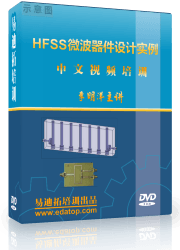- 易迪拓培训,专注于微波、射频、天线设计工程师的培养
HFSS15: Defining Anisotropic Relative Permittivity Tensors
If the material property is anisotropic, its characteristics are defined by its anisotropy tensor. You must define three diagonals for anisotropic permittivity. Each diagonal represents a tensor of your model along an axis.
These tensors are relative to the coordinate system specified as the object’s Orientation property. By specifying different orientations, several objects can share the same anisotropic material but be oriented differently.
1. In the Relative Permittivity row in the View/Edit Material window, select Anisotropic from the Type pull-down list.
Three rows named T(1,1), T(2,2) and T(3,3) are added below the Relative Permittivity row.
2. Enter the material’s relative permittivity along one tensor axis in the Value box of the T(1,1) row.
3. Enter the relative permittivity along the second axis in the Value box of the T(2,2) row.
4. Enter the relative permittivity along the third axis in the Value box of the T(3,3) row.
If the relative permittivity is the same in all directions, use the same values for each axis.
These values can also be defined as variables.







